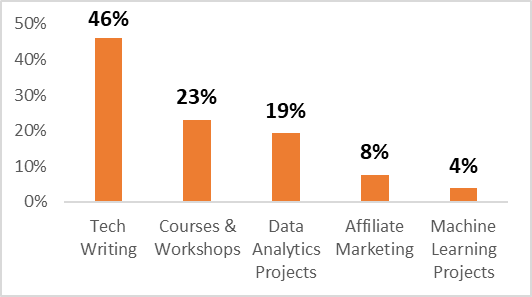How I Tripled My Income in One Year
And 7 steps you can take to do the same.

Two years ago, I was an 18-year-old university student living paycheck to paycheck working as a part-time tutor. The moment I got paid, I would spend money on things I couldn’t afford and was almost always broke by the end of the month.
I skipped classes at university and went out with friends every day, never really having to think about the future.
Then the Covid-19 pandemic hit and there was a lockdown imposed on the entire country. I lost my tutoring job. My parents lost a lot of money.
I didn’t know if we could continue paying for my education. In just a few months, everything that I had taken for granted was slowly disappearing.
Suddenly, my future seemed bleak and uncertain. It felt as though the safety net had been pulled out from under me.
I decided that I had to take control of my own life and make some changes.
In less than a year, I more than tripled my salary.
Now, one income stream pays me more than I earned in an entire month as a tutor
Here’s how I did it:
1. I Learned to Code
I had tried to learn programming a few times in the past but failed and stayed away from it ever since.
During the pandemic, however, I decided to give it another shot since I had nothing else to do.
This time, I reached out to experienced programmers and asked them for advice. I created a roadmap and visualized where I wanted to be in the next few months. I wrote down project ideas and decided to build them once I finished coding.
This process proved to be highly effective since it gave me direction.
I was no longer completing a bunch of coding tutorials aimlessly. I had an end goal in mind. Visualizing this and writing it down on paper ensured that I stayed on track and didn’t get distracted.
I also created a timetable and spent around 5–6 hours a day learning to code.
I landed my first data science internship less than six months into learning programming, and now have a full-time corporate job in the field.
Takeaways:
- Learn a High-Income Skill — High-income skills give you job security. Even if you lose your corporate job, you can get freelance work and build a passive income stream easily.
- Describe Your Goals — If you want to learn something new, write down your end goal. Create a vision board if possible. Research shows that we are so much more likely to follow through with something if we can actually see it.
- Stick to a Schedule — We all start things when we are passionate about them, then lose motivation when the going gets tough. Creating a schedule and following it religiously will help you stay disciplined.
2. I Started Freelancing
I started writing programming tutorials on Medium in May 2020.
The first $5 I earned on the platform changed everything. I realized that I could make money online doing something I enjoyed — without having to actually go to work.
As I kept writing on Medium, my audience expanded. Clients started reaching out to me on LinkedIn with freelance opportunities.
Now, I make around 70% of my income from freelancing and only 30% from my full-time job.
Here is a breakdown of my freelance income by type of project:

Notice how there is a huge demand for content creation in the technical space. I make most of my freelance income by blogging and creating courses around programming and data science.
Takeaways:
- Build a Social Media Presence — Most of my freelance clients have reached out to me after seeing my work on LinkedIn and Medium. It is critical to continuously market yourself regardless of the type of work you do. Create a portfolio website, post consistently on social media, and publish articles online.
- Select a Niche — This is especially true for writers since there are many freelancers out there competing for the same opportunities. Choosing a niche makes it easier to establish yourself as an expert in your field. I specialize in writing technical articles, but there are many different areas you can pursue as a writer depending on your interests and expertise.
3. I Decided I Was Worth More
When working as a tutor, I remember asking for a $100 salary increment.
I thought it was well-deserved. After all, my students’ grades had improved dramatically ever since I started tutoring them.
I used to conduct extra classes for free when they had exams. I even spent my free time preparing learning material and creating handwritten notes with drawings to explain complex topics.
I did more than I was expected to and thought it was only fair to be rewarded accordingly.
Despite all that, I was turned down. I never brought the topic up again, as I was afraid to push for what I deserved.
I continued working more hours than I was paid for because my students had grown accustomed to it and simply expected me to do so.
When I started to freelance, I initially had the same mindset. I accepted lower fees because I was afraid of losing clients.
Many of them assumed I was from India and expected me to charge lower rates. I once accepted $50 for a 2,000-word data science tutorial. For context, the market rate for an article like that is approximately $500-$1,000.
Nowadays, I have started to charge people rates that I think are fair. I am no longer afraid to turn down opportunities if I feel like they aren’t worth it.
Did I lose clients after doing that? Sure.
But I also found many more who were willing to reward me handsomely for high-quality technical articles, since it is a niche that not many freelancers specialize in. And if I had signed contracts with low-paying clients, I wouldn’t have been able to seize many of the good opportunities that came after.
Takeaways:
- Know Your Worth — Do not be afraid to turn people down because you think you can’t do better.
- Negotiate — When starting out in any field, you will initially be underestimated and lowballed because of your “lack of experience.” At this time, you need to stand your ground and negotiate to get what you deserve.
4. I Capitalized on My Strengths
I learned that there was something I excelled at and loved to do — teaching.
All those years of being a tutor have made me really good at taking a complex topic and simplifying it.
I now use that skill to write data science tutorials and run beginner-level courses in the subject.
Previously, my request for a $100 increment was rejected.
Now, a one-weekend course pays me more than my monthly salary did.
Takeaways:
- Play to Your Strengths — James Clear mentions in his bestselling book Atomic Habits that to win, you must play to your strengths. You simply cannot excel at everything — so choose something you are good at and work towards becoming better at it.
- Combine Your Skills — To really stand out, find two or three things that you are good at and combine them. For instance, I mixed my coding, analytical, writing, and teaching skills to form a unique, profitable skillset — despite not being the best at any of these things individually.
5. I Stopped Listening to Other People’s Opinions of Me
A few years ago, I was told by an instructor that I was not a technical person at all and that I simply wasn’t cut out for programming.
Her statement impacted my self-esteem so much that I gave up on learning to code for an entire year after that.
I had a friend who was told the same thing by the professor. She got so demotivated that she gave up on her dream of becoming a programmer and went back to her old accounting job. She is working there to this day.
When I started learning to code again, the biggest barrier I faced was mental. My instructor’s words kept echoing in my mind, and there were days when self-doubt considerably slowed down my progress.
I have now learned to never listen to another person’s opinion of me.
Takeaway:
Listen to Yourself First — The things that other people tell you do not define who you are. Choosing to believe them can do irreparable damage and take away years from your life.
6. I Did Not Give Up
This one might sound like a cliché, but it’s worth repeating.
When I first tried learning to code, it felt as though everything my programming instructor said to me was true. My code failed repeatedly at first. I could barely understand the instructions provided in coding tutorials.
I felt like quitting.
You see, humans are programmed by evolution to seek safety. When we try something new and it doesn’t work out or someone criticizes it, our survival response kicks in. Our first instinct is to retreat.
That is why so many of us give up before we even really start.
That is why my friend decided to go back to the old, dreary accounting job she hated. She decided to fall back on what’s worked in the past, despite knowing how miserable it made her before.
Takeaway:
You Can Do Hard Things — When something scares you or seems too difficult, it is a sign that you are stepping out of your comfort zone. Many people tend to retreat at this point and choose to go back to a place of security. However, real growth happens when you decide to stop seeking safety and do difficult things.
7. I Stopped Thinking I Had To Be the Best at Everything
I am not the best writer, data scientist, or programmer.
There are so many things I don’t know. I experience imposter syndrome at least once a week at work when someone brings up a topic I’ve never heard about before.
It still takes me a minute to identify when to use “its” and “it’s” correctly in a sentence.
And that’s okay.
I have come to terms with the fact that I don’t have to be the best at everything I do. I just need to become slightly better at them every day.
If I had waited to become really good at writing, I would never have started publishing articles. Had I waited to become the best programmer before applying for jobs, I would still be unemployed.
Takeaway:
Just Start — You can read 100 pages every day and take countless programming classes, but the only way to become good at something is to stop preparing and just start doing it.